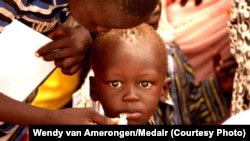The World Health Organization (WHO) said a "substantial part of the population” in the developing world lacks access to quality, essential medicines. The group's director of essential medicines, has been meeting with African health officials in Zimbabwe on how to improve the situation in conjunction with the United Nations and the European Union.
Health officials from more than 15 African countries are meeting in Harare to discuss how the continent, and the developing world, can improve access to essential medical drugs.
According to the World Health Organization, the overall objective is to achieve health-related millennium development goals and universal health coverage in African, Caribbean and Pacific countries. This would be done through improving availability, affordability and use of quality essential medicines for priority acute and non-communicable diseases, thus improving cost effective health care and better patient health outcomes.
“We estimate that particularly in low and middle income countries, a substantial part of the population still has problems to access essential medicines. Partially that is an issue of money," WHO Essential Medicines Director Kees de Joncheere, told VOA referring to the situation in developing countries. " It is also a matter of efficiency and waste. We often see that countries are either not buying the right drugs, and instead of setting priorities and instead of investing in essential medicines they might be spending money on products that may not be addressing the needs of the population.”
Zimbabwe could be considered one of the countries not setting priorities, with all senior government officials driving the latest luxury vehicles and making several foreign trips while it depends on external funding to buy essential drugs such as ARVs.
Access to medicine
Zimbabwe Minister of Health David Parirenyatwa said his government is making headway to ensure all its citizens have access to essential drugs, though the coffers are almost empty.
"In this country, all our health facilities are now manned by trained medicine supervisors. This development is a good one. And I am quite certain that in most of our African countries that is indeed the situation. But I have seen people using drugs that are long, long expired. I think that is an issue that we need to take cognizant [be aware] of," Parienyatwa said.
Both the WHO official and Parirenyatwa said the issue of herbs in Africa also needs to be discussed. Some people in Africa resort to herbs if they are unable to afford medical drugs. Regina Mbindyo is a pharmacist from Kenya attending the WHO meeting in Harare. She said medicines are still costly in her country, but it is not all doom and gloom.
“In Kenya we have a mixed situation. I think availability of medicines in some areas has improved a lot; for example for HIV/AIDS [and] for malaria. But there are areas such as non-communicable diseases and medicines for children where sometimes the medicine is not available. It is too expensive compared to adult medicine, or there are other challenges to make it readily available,” she said.
It is such challenges that WHO, health experts from Africa and the African, Caribbean and Pacific Group of States, with assistance from the European Union, hope to overcome and ensure that they are dealt with in the developing world.




